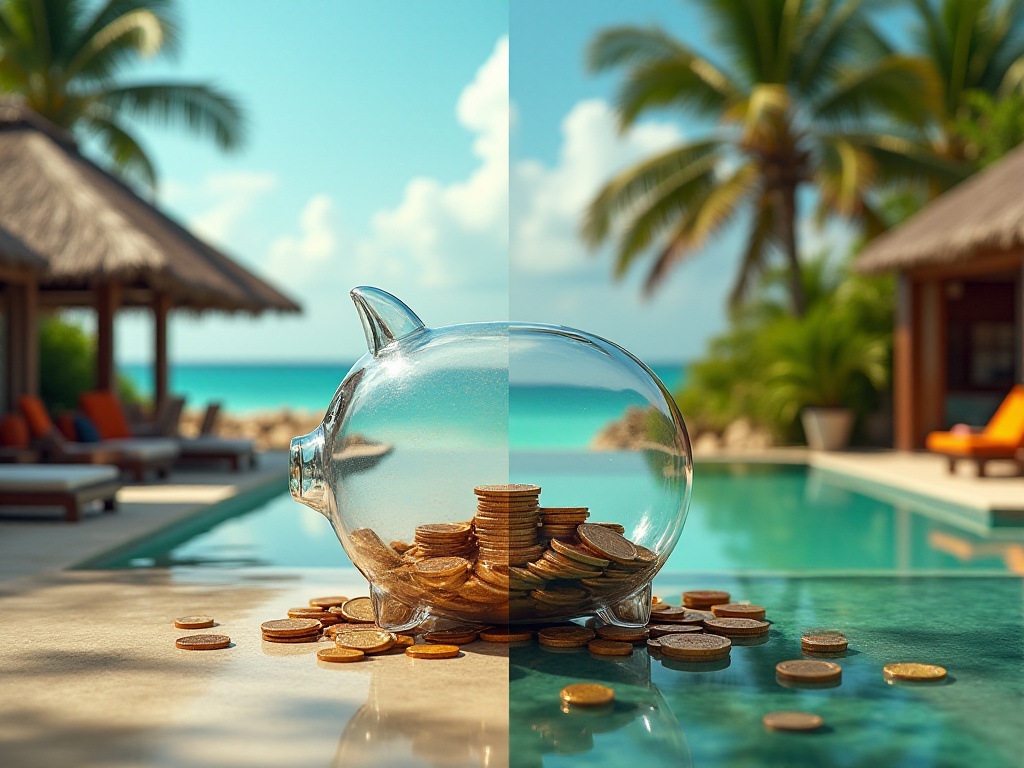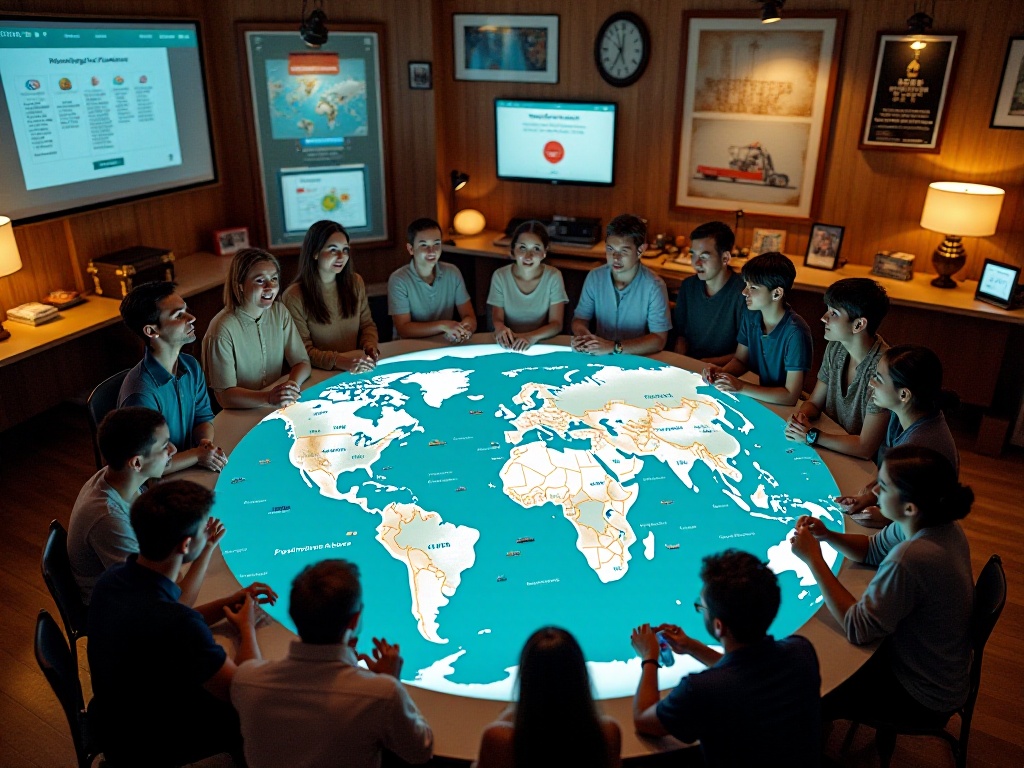Opening Chat
Recently, my social media feed has been flooded with European travel posts, with friends sharing all sorts of beautiful travel photos. Some are posing under the Eiffel Tower, others are skiing in the Swiss Alps, and some are riding gondolas in Venice... it makes me really want to go too. However, I've noticed many comments like "I want to go so badly, but I don't know if my budget is enough" and "Europe is so expensive, it must cost a fortune." Actually, I've been to Europe several times, and I've always managed to control my budget pretty well. Today, I'll share my experience and teach you how to plan a spontaneous European trip.
When I first went to Europe, I was also a budget novice and had no idea how much money to prepare. I remember saving 30,000 yuan, planning to travel for two weeks, but due to poor planning, I spent more than half of it in the first week. In subsequent trips, I gradually developed a budgeting method that not only allowed me to enjoy myself but also save quite a bit of money.
Budgeting Methods
Regarding budgeting, I've noticed my friends often face a dilemma: some say you should set the budget first to avoid overspending; others think you should list out the activities you want to do first to avoid regrets. I've tried both methods, and they each have their advantages.
If you're like me when I first went to Europe, a relatively new worker with limited funds, I recommend using the fixed budget method. For example, if you have 30,000 yuan, treat that as your budget ceiling. That's what I did on my second trip to Europe, dividing the budget into several parts: 8,000 for flights, 8,000 for accommodation, 12,000 for daily expenses, and 2,000 for emergencies. Then plan your specific itinerary based on this budget.
The advantage of this approach is that you won't stress about going over budget. For accommodation, I would choose hostels or guesthouses, costing only 200-300 yuan per night, plus you can meet many interesting fellow travelers. For meals, I would have breakfast at the accommodation, buy sandwiches for lunch, and go to local restaurants for dinner, which is both economical and authentic. For attraction tickets, I would buy passes or combo tickets online in advance, which is much cheaper than buying on-site.
However, if you're a seasoned worker who's been in the workforce for years and are looking forward to experiencing some special activities on this trip, I recommend using the cost estimation method. This involves listing all the places you want to visit and experiences you want to have, then calculating approximately how much money you'll need. For example, when I last went to Switzerland, I wanted to experience skiing, hiking, and hot springs, and calculated that I would need about 50,000 yuan, so I started saving specifically for that.
I remember a friend who really wanted to try a Michelin-starred restaurant and found out it would cost over 1,000 yuan for one meal. But she felt it was one of the most important experiences of the trip, so she reduced expenses in other areas, like choosing a regular hotel instead of a luxury one, and successfully checked the restaurant off her bucket list.

Core Expenses
When it comes to European travel expenses, the major costs are the most headache-inducing. Let me share my experience in detail.
First is airfare, which is the biggest expense. Flying from China to Europe, prices vary greatly depending on the season and airline. Generally, July-August is peak season, with round-trip tickets costing at least 8,000-10,000 yuan. I prefer going in April-May or September-October, when round-trip tickets usually range from 5,000-7,000 yuan. Last year, I went to Paris in September and got a special fare ticket for just 4,800 yuan, which was an incredible deal.
There's a trick to booking flights: start monitoring early. I usually start looking at tickets 3-6 months in advance. You can download several booking apps and set price alerts. Airlines often have promotions where you can save quite a bit. Also, choosing flights with layovers is usually cheaper than direct flights - if you don't mind spending extra time, it's a good way to save money.
For accommodation, I've tried everything from hostels to five-star hotels. A standard double room in a hotel in big cities like Paris costs at least 700-1,000 yuan per night. A hostel bed costs around 150-300 yuan. However, I personally think it's not worth being too frugal with accommodation since you need good rest after a day of sightseeing. I now usually choose three-star hotels or well-reviewed guesthouses with good value for money, spending 500-800 yuan per night for clean and comfortable accommodations.
Regarding daily expenses, it's mainly about food and entertainment. Let me break down the costs. Breakfast at your accommodation costs about 30-50 yuan, just bread and coffee is enough. Lunch might be sandwiches or fast food, 80-120 yuan. Dinner at a small restaurant costs about 200-300 yuan per person. Of course, if you want to try Michelin-starred restaurants, the budget needs to go up.
Transportation costs are mainly for metro and buses, about 50 yuan per day. Attraction ticket prices vary greatly - major attractions like the Louvre cost around 130 yuan, while smaller museums might be 70-80 yuan. So daily basic expenses, not including shopping, reasonably range from 500-800 yuan.

Money-Saving Tips
After discussing expenses, let me share some money-saving tips - these are lessons learned from my own experiences.
First and most importantly is choosing the right time. Europe's peak season is usually July-August, when there are not only more tourists but also higher prices. I recommend avoiding this period if possible. September-October is particularly suitable, with nice weather and fewer tourists, and prices can be about one-third cheaper. Last year in September, I stayed at a four-star hotel in central Paris for just 600 yuan per night - in August it would have been at least 900.
Transportation planning is also important. If you plan to visit multiple cities, I recommend buying a Eurail Pass. Although the initial investment seems large, it's very cost-effective in the long run. Last time, I used a Eurail Pass to visit five countries - France, Germany, Switzerland, Italy, and Austria - averaging only about 200 yuan per journey, whereas individual tickets would have cost at least 400-500 yuan. Plus, with a pass, you have the freedom to go wherever you want.
There are also many ways to save on attraction tickets. Many attractions offer combination or pass tickets, like the Paris Museum Pass, which costs only 60 euros for four days and gives access to over 60 museums. Also, many attractions offer student or youth discounts, so remember to bring your student ID or youth hostel card.
Food is also a significant expense. My suggestion is to have breakfast at your accommodation, buying bread and jam from the supermarket. For lunch, you can buy sandwiches and fruit from the supermarket and have a picnic in a park. For dinner, go to restaurants where locals eat - they're not only cheaper but more authentic. I found a great French restaurant in Paris where meals averaged only 20 euros per person, less than half the price of restaurants in tourist areas.
For accommodation, if you're traveling alone, hostels are really cost-effective. On my first trip to Europe, I stayed in hostels and met many interesting friends while sharing travel tips. However, make sure to check reviews and choose ones with good reputations to ensure safety and hygiene. If traveling with two or more people, I recommend staying in guesthouses or apartments - having a kitchen means you can cook your own meals and save on dining costs.

Implementation Management
After all this planning talk, implementation is also important. I recommend starting budget preparation at least six months in advance.
Here's what I did: First, I opened a dedicated travel savings account and transferred a fixed amount each month when I got paid. By the time I needed to buy plane tickets, I had saved enough. The remaining months were for preparing other expenses. I would also put extra income like year-end bonuses and overtime pay into the account, making the budget more comfortable.
During the trip, keeping track of expenses is crucial. I use a mobile expense tracking app and spend a few minutes before bed each night recording the day's expenses, allowing me to monitor the budget usage in real-time. If I notice that spending in one area is exceeding expectations, I can adjust accordingly. For example, if accommodation costs are over budget, I can economize a bit on dining.
I also organize daily expenses by category, such as transportation, dining, admission fees, etc. This not only helps me understand where the money is going but also serves as a reference for friends later. Now when my friends plan European trips, they often ask for my budget advice, and I can show them my expense records, which is very helpful.

Final Thoughts
Looking back on my European trips, although the budgets were different, I enjoyed each one. The first time, I probably wasted some money due to inexperience. But with accumulated experience, I've become better at being cost-effective and getting the best experiences within a limited budget.
Actually, for European travel, budget isn't the most important thing. What's important is learning to plan and balance priorities. You might not be able to stay in five-star hotels, but staying in hostels lets you meet more interesting people; you might not eat at Michelin-starred restaurants every day, but local street food might offer more authentic flavors. As long as you plan your budget well, you can arrange an amazing European trip.
As my friend says, what matters most in travel isn't how much money you spend, but how many unforgettable memories you collect. I hope every friend who dreams of Europe can make their dream come true and find their perfect budget plan. If you have any specific questions, feel free to discuss them - I'm happy to share more of my experience. Let's plan a perfect European trip together!




